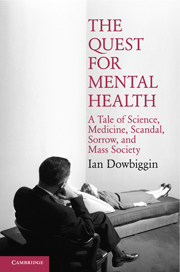 Depression, PTSD, the efficacy of drug treatments—news on mental health seems to dominate the headlines these days, and with good reason. Alongside other afflictions such as cancer, heart disease, and obesity, the number of Americans suffering from a form of psychiatric disease has ballooned dramatically: in 2004, for example, a U.S. psychiatric survey found that one in ten Americans had an addiction disorder; nearly 20 million suffered from mood disorders; and another 23 million met the criteria for anxiety disorders.Such staggering numbers can’t help but lead one to wonder: why is mental illness one of the fastest growing epidemics today?
Depression, PTSD, the efficacy of drug treatments—news on mental health seems to dominate the headlines these days, and with good reason. Alongside other afflictions such as cancer, heart disease, and obesity, the number of Americans suffering from a form of psychiatric disease has ballooned dramatically: in 2004, for example, a U.S. psychiatric survey found that one in ten Americans had an addiction disorder; nearly 20 million suffered from mood disorders; and another 23 million met the criteria for anxiety disorders.Such staggering numbers can’t help but lead one to wonder: why is mental illness one of the fastest growing epidemics today?
For our Book Club this month, we’re discussing The Quest for Mental Health (on sale September 20th), a book that shows why achieving mental health became one of our society’s most pressing concerns—and the lengths we’ll go to attain it. Historian Ian Dowbiggin shows that the mental illness epidemic has reached a crisis point because mass society has been enveloped by consumerism and therapism. Whether individuals believe the remedy can be found in drugs or psychotherapy, many simply accept that they suffer from a bona fide medical condition beyond their control—an entrenched belief that has triggered the rise of a loose coalition of psychiatrists, psychologists, counselors, therapists, social workers, and life coaches. Coupled with the media industry’s impact, it is no wonder that many have become dependent on bureaucratic and managerial approaches to health and welfare.
After you’ve checked out our Book Club, which features a Q&A with Ian Dowbiggin, a reading group guide, brief timeline, and slideshow, we want to know what you think of the troubling state of mental health today. What’s your take on Dowbiggin’s argument? Do you think mental illness is a genuine epidemic, or are there other factors facilitating its rise?
Share your thoughts here, or chime in on Twitter using the hashtag #cambridgeideas.
Latest Comments
Have your say!